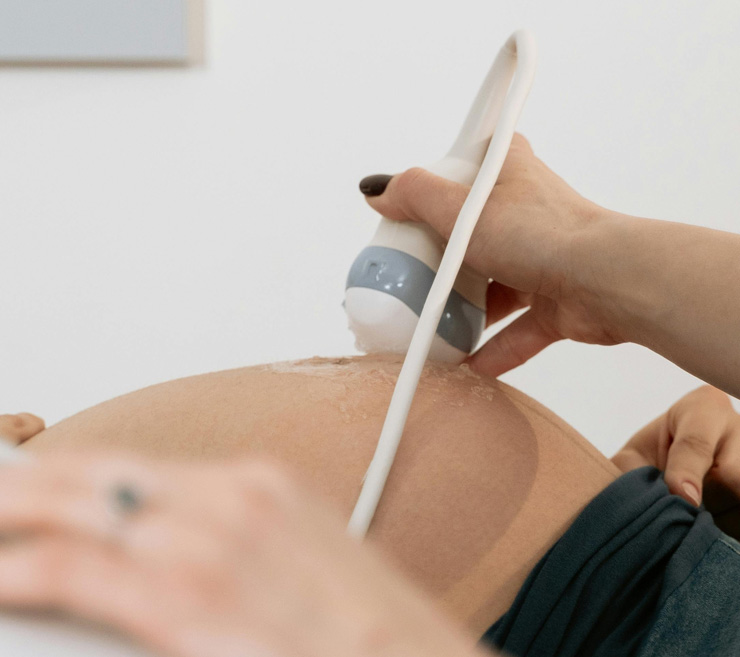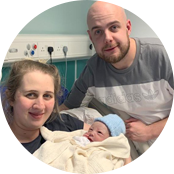Reproductive Immunology
Tambre’s Reproductive Immunology Unit is responsible for studying and planning diagnostic and therapeutic measures to prevent the immune system from becoming an obstacle to the achievement and viability of pregnancy.
Would you like us to study your case?
What is reproductive immunology?
The immune system plays a crucial role in protecting the body against foreign invaders and in eliminating damaged or abnormal cells.
Occasionally, the immune system fails, and cannot differentiate between self and non-self, so it attacks the body’s own cells, leading to well-known autoimmune diseases (lupus, multiple sclerosis, Crohn’s disease etc.).
A special situation occurs during pregnancy when the immune system must tolerate and maintain the developing embryo, as it carries half of the father’s genetic antigens and is therefore partially “foreign” to the mother’s immune system.
There are a multitude of immune system disorders that can hinder pregnancy, both in men and, above all, in women. The main immune-based problems that can influence fertility are:

Phospholipids are substances necessary for the proper functioning of blood circulation and clotting. When antiphospholipid antibodies, which are a type of immune system cells found in maternal blood, appear, they cause clotting problems, such as thrombosis in arteries or veins, leading to thrombus formation in the placenta and pregnancy loss or premature delivery.
This is the most common form of male immunological infertility. Anti-sperm antibodies, which can form in both male and female bodies, are a type of protein that binds to sperm, affecting their ability to move and fertilise the egg.
This autoimmune pathology consists of the appearance of abnormal blood clots in blood vessels (veins and/or arteries). This is due to a lack of natural anticoagulants or mutations of the anticoagulant systems or fibrinolytic mechanisms.
The woman’s immune system does not recognise the embryo as her own, and antibodies are formed to attack it. In these patients, a high number of Natural Killer (NK) cells, a type of lymphocyte with the ability to destroy organisms it does not recognise as part of the woman’s body, are found. As a result, embryo implantation is prevented or miscarriage may occur.
The Tambre Immunology Unit will analyse your case.
We study your immune system so that we can provide effective and personalised reproductive solutions for each case.
Diagnosis and personalised treatment at the Reproductive Immunology Unit
Tambre was the first assisted reproduction clinic in Spain to incorporate a Reproductive Immunology Unit. This service, headed by Dr. Sergiu Padure, combines extensive experience with maximum innovation to identify, diagnose and treat immunological problems that may affect fertility and pregnancy.
The work of the Reproductive Immunology Unit begins after we have ruled out the most common problems that may explain reproductive failure in the couple (chromosomal abnormalities in the sperm or eggs, anatomical or endocrine problems). This is when Tambre’s Reproductive Immunology Unit carries out a complete study of immunological factors related to primary infertility, implantation failure following in vitro fertilisation (IVF), repeated miscarriages and pre-eclampsia or eclampsia in pregnancy.
We carry out a thrombophilia study, which includes lupus anticoagulant factor, anticardiolipin antibodies, antiphospholipid study, etc.
We can then also carry out an immunological study of antibodies, Natural Killer cells, cytokines, KIR-HLA compatibility, etc.
Depending on the results, we will prescribe the most appropriate treatment. For example, if immunological infertility is caused by antiphospholipid syndrome, then it can be treated with antithrombotic drugs. However, if the autoimmune infertility is due to coeliac disease, then it may be advisable to follow a gluten-free diet, or if the number of Natural Killer cells in the analysis is high, we will have to resort to other treatment options such as corticoids.
The Reproductive Immunology Unit offers preconceptional, postconceptional and throughout pregnancy assessment and treatment, in order to closely follow up during treatment to evaluate response and adjust the treatment plan as needed.

The Reproductive Immunology Unit offers assessment and treatment preconception, post-conception and throughout pregnancy, with close monitoring during treatment to assess response and adjust the treatment plan as necessary.
By optimising the uterine environment we are improving the success rates of the assisted reproduction treatments we perform at the clinic. The close collaboration between the different medical units in order to develop fully personalised treatments allows us to treat complex cases and position ourselves as specialists in Advanced Reproductive Medicine.

Benefits of assisted reproduction for immunological sterility problems
In addition to treating immunological problems, we can also use assisted reproduction treatments to improve pregnancy options:
- Artificial insemination (AI). Since in AI, the sperm is introduced through a cannula into the uterine fundus, it does not come into contact with the anti-sperm antibodies, the immune system does not act against them and they can reach the egg to fertilise it.
In vitro fertilisation (IVF). If the ICSI technique is used in IVF, and the sperm is introduced directly into the egg, we eliminate any possibility of interaction with the antibodies.

At Tambre we can provide you with a personalized diagnosis on your first visit.
Specialists in Advanced Reproductive Medicine
We are pioneers in assisted reproduction in Spain and Europe.
45 years of medical excellence.
We design tailor-made treatments.
- State-of-the-art assisted reproduction laboratory.
- Our own andrology laboratory.
- RI Witness™ for the safety and traceability of gametes.
- GERI®: Embryo Incubator®.
- Fenomatch, we find the right egg donor and/or sperm donor and match them with you.
- Zymot-ICSI (Chip Fertile), selection of the best sperm before ICSI.
- You will have your own gynaecologist and nurse, except for emergencies, and the same medical team will follow your case in depth and attend you from the beginning to the end of the treatment.
- You will have a consultant from our Specialised Tambre Care team who will support you and answer any question you may have throughout the whole process.

Dreams come true
Real stories like yours

A Beautiful Journey of Hope: Victoria’s Experience at Tambre
With the right support and expertise, the journey to parenthood can indeed be wonderful. “We couldn’t have asked for more from Tambre”
Read more

The happy ending to the story of Kirstie and Chris
“I accompanied Kirstie and Chris on that first visit to Madrid but they didn’t really need me as the Tambre team made them feel extremely welcome from day one so I felt very comfortable”
Read more

Our Most Travelled Patient and her Latest Destination, Tambre!
“We had huge expectations and I think they were met. I think it was a really lovely experience from start to finish,” Nicola acknowledges.
Read more
We stay with you
Shall we call you?









